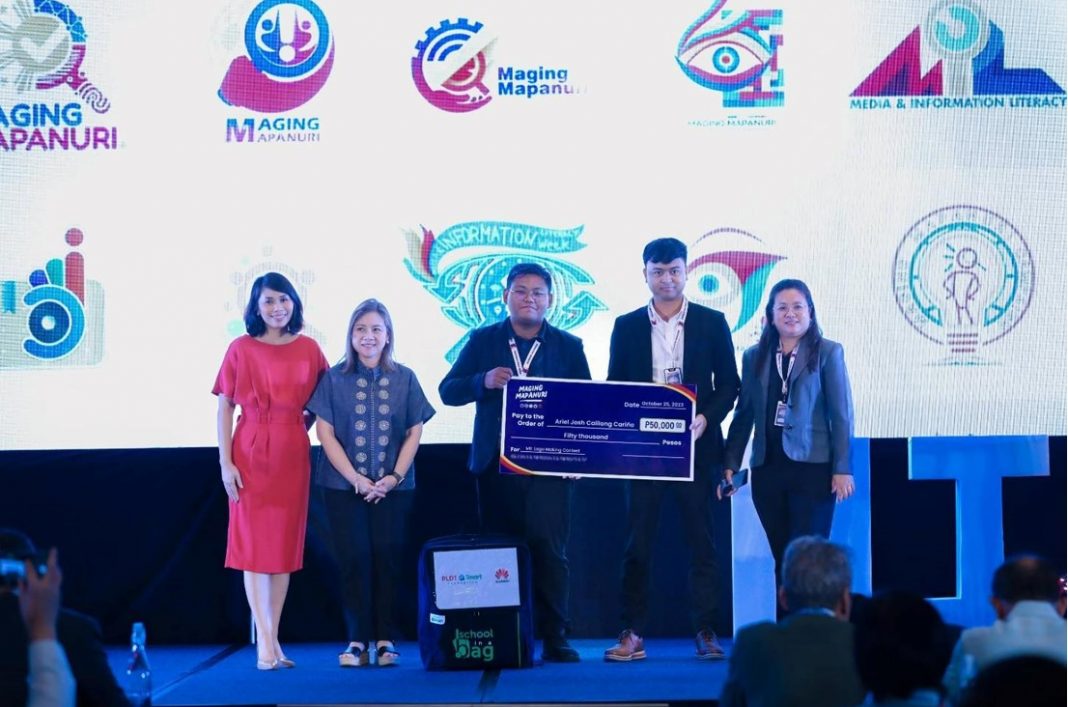Huawei Philippines, in collaboration with PLDT-Smart Foundation and the Presidential Communications Office (PCO), is boosting efforts in bridging the education gap in underserved communities and schools in the country with the “School-in-a-Bag” initiative.
During the government-organized “Maging Mapanuri”: Media and Information Literacy Conference last October 25, the PCO handed over a ‘School-in-a-Bag’ package to Rizal Technological University in recognition of the university and its engineering student, Josh Cariño, who emerged as the winner of PCO’s Digital Logo-Making Contest. Cariño also received a cash prize from the organizer.
Presidential communications secretary Cheloy Velicaria-Garafil cited Huawei and PSF for supporting the MIL campaign and for “fostering comprehensive education and bridging the digital divide.”
“Huawei and PLDT-Smart Foundation’s School-in-a-Bag program aligns with our mandate to advance communications with our constituents as its contributions empower students with the essential tools to enhance media information literacy, foster a comprehensive education and bridge the digital divide. We thank School-in-a-Bag for their pivotal role in this endeavor and its support to the Media Information Literacy (MIL) campaign,” Garafil said.
Huawei’s support of the initiative underscores the commitment of the company to bring digital to every person, every home, and every organization to make a fully connected and intelligent world.
“One of the advocacies of Huawei under Tech for All is education, specifically its digital component, because we believe it to be life changing and formative. We want today’s youth to become digitally empowered,” said Karrie Buenafe, Huawei Philippines senior public affairs manager.
On October 10, in an effort to demonstrate Huawei Philippines continuous commitment to empower remote communities by bringing inclusive education, a “School-in-a-Bag” package was also turned over to Mapanas, Northern Samar mayor Ronn Michael Tejano.
Present during the turn-over were were PLDT-Smart Foundation president Esther Santos, PLDT and Smart stakeholder management team head and AVP Stephanie Orlino, and Huawei’s Buenafe.
“We all know that technology is a force that you cannot disregard, and it is already a part of our lives. Because of certain challenges, our municipality can hardly keep up. We thank PSF, PLDT, Smart, and Huawei for giving us an opportunity to elevate the quality of education in our hometown. Letting our learners experience such technology from School-in-a-Bag can help them reach their full potential, which can go a long way,” said Tejano.
The “School-in-a-Bag” is a portable digital classroom designed to align with the Department of Education’s curriculum, with the aim of significantly enhancing educational access and ensuring that educational resources reach every corner of the nation.
Each School-in-a-Bag package contains a laptop and 10 tablets pre-loaded with DepEd curriculum-based learning materials, mobile Wi-Fi, and expandable storage devices. It is also inclusive of teacher training and year-long monitoring support.
“PSF remains fully committed to extending quality education nationwide, especially in hard-to-reach areas. We aim to supplement the existing education system of Mapanas through inclusive and sustainable digital tools included in each SIAB package,” said Santos.
Last week, a School-in-a-Bag was also turned over for Pili Elementary School in Northern Samar last November 17, 2023, in partnership with SODA, a non-profit organization that focuses on initiatives geared towards technology and youth, and leads the “Sulong Dunong” campaign that aims to mitigate the learning gaps and learning losses among provincial schools through digital educational materials.
Sabtang National School of Fisheries, the only high school in the municipality of Sabtang, Batanes, has also been one of the recipients.
“We acknowledge that last-mile schools still have limited access to technology and connectivity. In the last 20 years, PLDT and Smart have been implementing education programs to help address this existing digital divide and to eventually spark joy in learning among Filipino students,” said Orlino.




